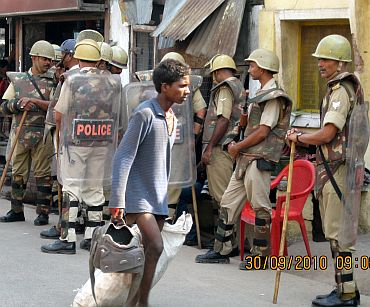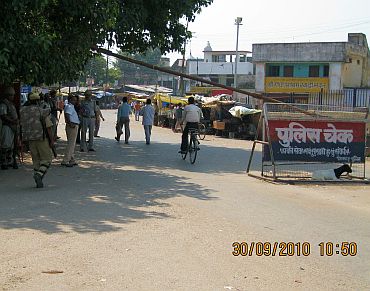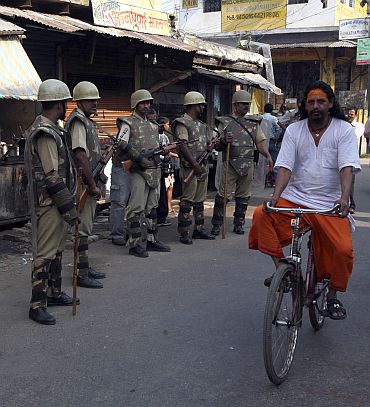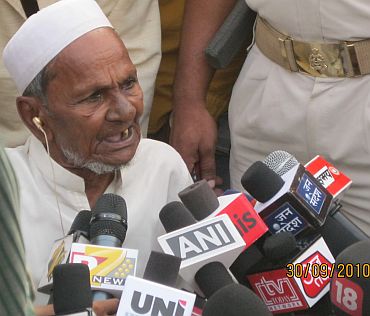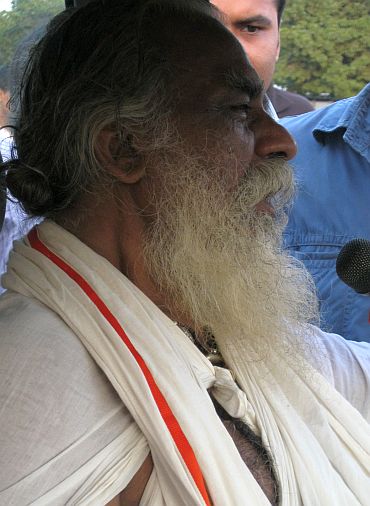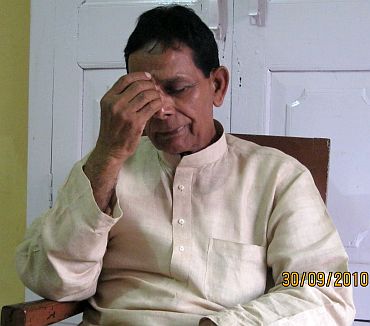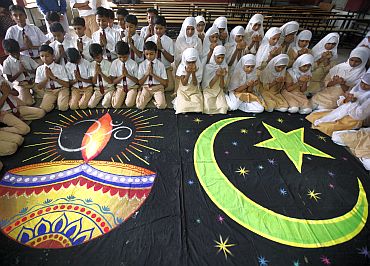 | « Back to article | Print this article |
How Ayodhya reacted to the verdict
Shops had not opened yet. People were seen in their balconies performing their morning ablutions. It was just 6 am, but the presence of security power, even then, was overwhelming.
Armed with bullet proof vests, helmets, AK-47s, knee pads and helmets, policemen and paramilitary force personnel were seen either manning roads in groups of five or six or squatting outside unopened tea shops.
"It is judgment day," a constable says simply.
Nervous policemen honed at the entry point of the disputed Ramjanambhoomi. Ten armed security forces guarded the entry point, searched people without explanations.
"No pens, books, belts, bottles and mobile phones are allowed. Anything else you might be carrying which we do not approve of will not be allowed," a policeman announced.Click on NEXT to read further...
How Ayodhya reacted to the verdict
This was just the first in a series of checks to the disputed land. Five more followed, each more extensive than the previous one. The way to the temporary tent structure of Ram Lalla is a military structure and is not even broad enough to accommodate two people walking side by side.
Finally we reached the Ram Lalla idol, which stood isolated some 100 meters away. A priest blessed and gave away prasad. He looked nervous when I told him I was from the media.
"The verdict is today. We are hopeful. I just pray Ramji is allowed to stay here," Santosh Tiwari, the priest said, even as an armed armyman standing opposite him tried to hear every word he uttered.
"I don't want to say anything else," Tiwari said resignedly, when asked what he thought the verdict would be.
How Ayodhya reacted to the verdict
On the way back to the road, I met Mohammed Rehman, the only Muslim to sell darshan material at the Janambhoomi.
"What do I say, sir? The decision will happen irrespective of my opinion. But truth be told, the Ram Mandir should not go. It is a very spiritual place for many Hindus," said Rahman, who has had his shop here for the past six years.
A little ahead, there was a flurry of excitement as something was being announced on the police loudspeakers.
"Stay alert. Do not remove your helmets or bulletproof vests. Be ready for anything and be vigilant," the speakers blared to policemen.
Next stop was the house of 90-year-old Mohammad Hashim Ansari, the oldest litigant in the Ayodhya case. Ansari is a part of the Babri Masjid Action Committee and has been involved in the Babri litigation since 1950.
How Ayodhya reacted to the verdict
"It is no longer a religious problem. It is a political one. Political parties are using the issue as a weapon," Ansari said.
And he is right. In the history of Ayodhya, only one case of rioting was registered in Ram Janambhoomi police station from 1950.
"There have been many deaths across the country over this issue, but Ayodhya in itself has always been peaceful," Ansari said.
As I got back on the roads, security presence seemed to have increased. A policeman told me that around the small town of Ayodhya, over 5,000 security personnel had been deployed. The main entry to the town was barricaded, with tear-gas shells equipped policemen checking visitors.
Autorickshaws in the town carried posters saying Aman Mera Vachan, Hind Mera Vatan and shops opened to business as usual. As far as the locals were concerned, it was just another day, verdict or no verdict.
How Ayodhya reacted to the verdict
"It is too old an issue. There are so many other burning issues in the town that locals just don't care anymore. Yes, Muslims would like to pray there and yes, Hindus would like Ram Lalla to remain as it is, but they will not riot over it anymore," a tour operator, Raghvendra Shukla.
POST VERDICT
Post 3.30 pm, the expected time of verdict, people were glued to their television sets and radios. I settledf down outside the house of Hashim Ansari. At about 4.30 pm, a wave of applause broke out a little further from his house. Hindus were celebrating. Some Muslims, camping outside Ansari's house looked dejected.
A little later, Ansari himself came out and sat on a chair as local media swooped on him.
"I welcome and respect the court's decision. It is now the Sunni Waqf Board's decision whether they want to move the Supreme Court. I have only one appeal to the people of Ayodhya. Those who want to celebrate and mourn, please do it in the privacy of your homes," Ansari said.
How Ayodhya reacted to the verdict
It looked like none of the parties involved in the litigation was happy with the decision and talked of moving the Supreme Court against the verdict.
Nitya Gopal Das, the chairman of Ram Janmbhoomi Nyas, was a little more aggressive than Ansari.
"We accept the decision, but we will still move the Supreme Court. We are happy the court has recognised historical facts. I only hope other communities do so as well. Ram's history goes back lakhs of years and Ayodhya's history goes back crores of years. The entire land is Ram's; we are not really happy with getting just 33 per cent of it," Das told rediff.com.
How Ayodhya reacted to the verdict
Half a kilometre ahead, Haji Mahboob Ahmad, member of the BMAC, said he was not happy with the high court decision either.
"It is like telling me that I can occupy just 33 per cent of a house I have been living in for the past many years. We accept the decision, but we are not happy with it. We will move the Supreme Court against the verdict. We had all the correct papers showing that the land belonged to Muslims, but the disputed area still went to the Hindus. The decision was based on sentimental values as opposed to document evidence," Mahboob told rediff.com.
"Having said that, the political gimmicks involved in this issue will never end. I hope politics moves away from the issue and it is addressed purely as it is," Mahboob added.
How Ayodhya reacted to the verdict
The Nirmohi Akhada, which also was awarded a third of the disputed land, said they would move the Supreme Court after a meeting at night. The priest I talked to did not seem particularly happy about the verdict.
"We work like a panchayat here. We will decide whether to move the apex court or not after a meeting tonight. There is no ownership of Ram Lalla and we have only a third of the disputed land," Mahant Dinendra Das, the Sarpanch of Nirmoi Akhada told rediff.com.
Firecrackers are banned in the town to prevent any kind of celebrations. But as night fell, some people lighted candles outside their houses as small acts of defiance.
As a resident who lit candles explained, "Ramji's birthplace has finally been recognised. Should we not celebrate?"
